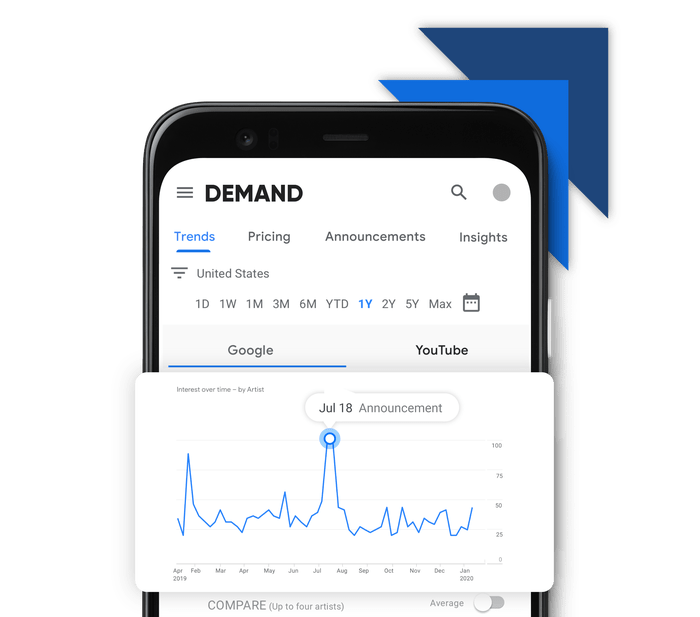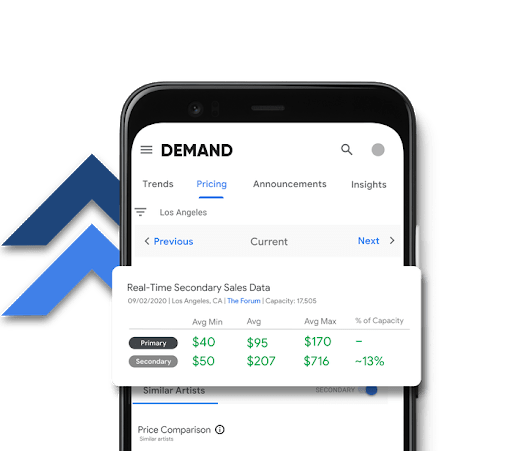DEMAND: The New Platform for the Live Music Industry
By Marcella Nahas and Felipe Ramos

What Is Demand?
Demand is an online data-analytics platform that uses big data to provide live statistics and insight into the live music and touring industry.[1] The project grew out of a partnership between Oak View Group and Google in early 2019 and was launched this February at Pollstar Live! 2020 Conference.[2] By providing data from Google, YouTube, and Google Play searches, as well as other third parties such as Pollstar[3], businesses can make more informed decisions in a timely fashion.
How Does the Platform Work?
Demand gives artists access to Google searches involving their name followed by keywords such as “tour”, “tickets”, “pre-sale”, and more. With this data, artists can determine the demand for their shows by activating different filters such as geographical areas. It is a way of measuring the impact that an artist is having on a specific region.
As Eric Gardner, Director of Booking at Oak View Group said, “Google’s metrics show that over 70% of all ticket purchases begin in Google Search.”[4] Demand offers valuable information because it narrows down the data to only those who have an active intent to buy[5]; therefore, this can potentially increase productivity in the touring ecosystem and lead to higher profits.
Launch at The Pollstar Live! 2020 Conference
On February 5th, 2020, the entertainment industry was presented with the revolutionary tool Demand. The panel was moderated by Eric Gardner, sharing the stage with participants Parag Vaish and Nick Turner, co-founders of Demand, as well as Jeffrey Azoff, Manager and Agent. The Demand website was launched as the panel began, so managers, agents, and other parties could request access to the platform right at that moment. On the date of its announcement, the platform already had roughly 19,000 artists in its database. The panelists revealed that the Demand project was born out of networking at the Pollstar 2019 conference.
Through a detailed breakdown of the platform’s functionality, Pollstar attendees had the privilege to see the platform in action first hand, with data from Harry Styles’ tour announcement – one of the first artists to test the platform. The panelists discussed how Demand can affect choices in ticket pricing, tour dates, locations, and brand partnerships. They also showed how Harry Styles’ tour announcement behaved in comparison with similar artists in the same market, and how managers could use this comparison feature to their advantage.[6]
Parag Vaish discussed the product development process, and how challenging it was to get approval to access data from various divisions at Google as well as the permission to share it.[7] Once they had the data, they faced the challenge of creating relationships between the different data sets.[8] The panel ended with Jeffrey Azoff inviting users to provide feedback once they began using the platform.
Shaping Ticket Pricing
What makes Demand so beneficial is that it runs in real-time. This ultimately creates the potential of a new dynamic in ticket sales as promoters will have the ability to check the day-to-day data and adjust prices as they go.
Setting the right prices for shows can be considered a struggle for promoters, venue holders, artist management teams, and other industry professionals. They often face the following question: “what are fans willing to pay?”
At the Google Demand Pollstar presentation, Azoff said that “this is an instinct-driven business; we’re really guessing; we’re guessing what the market will bear; we’re guessing what fans will be okay with; we’re guessing what’s fair. We don’t have a ton of data other than we can pull score reports. We can pull secondary reports, but no one is really consolidating that for us.”[9] This is where Demand comes in – there was a clear need for an informative and encouraging data hub. A place where industry professionals, such as Jeffrey Azoff, can access big data and use it to help structure more accurate and strategic price plans.

Consolidating Brand Partnerships
Demand provides data on what brands are being Googled by the artist’s fans. This feature allows artists and brands to discover their common market, which can ultimately result in noteworthy partnerships. The artist is now able to take this data and present it to a brand, and vice versa, while they collectively share an interest for their consumers. Demand divides their insights page within different markets, such as “travel”, “fashion”, “retailers” and more, making it easy to navigate.
Eric Gardner mentioned that “Demand allows you to identify brand affinity for your artist’s fans, and then utilize that search data to illustrate where a brand sits in the hierarchy.” Gardner continued, “[You are able to see how this develops from] the front end of the tour before everything gets announced, and then follow up at the end of the tour, to see if there are any visible metrics and the rise of brand awareness and affinity among that fanbase.”[10]
By looking at Harry Styles’ case study, the panelists indicated that his fans had almost double the interest in the brand Nike than the US national average.[11] According to Azoff, Styles’ management team was not aware of Nike’s popularity among his fans. As Vaish said, “this may present opportunities that folks in this industry might not have thought before.”[12]
How to Access Demand
At the Pollstar panel, Nick Turner referred to “this product as ‘the great equalizer’ because everyone now has access to the same data.”[13] In support of this broad access, Demand is free. To gain access to Demand, the user must have a Gmail account and use it to sign up as a trusted tester to the program. The approval time takes up to 1 or 2 days. Once authorized, the user receives an official welcome email from Demand and gains access to navigate the website: demand.area120.com/sign-in.
Conclusion
The touring industry can benefit from
having a powerful resource such as Demand because more knowledge of the market
can lead to positive outcomes. The message behind Google and Oak View Group’s
initiative with the Demand
project is clear: as Vaish remarked, “the focus that we have as part of
this group is to advance an industry forward, to look at ways in which we can
raise all boats in the industry.”[14]

[1] Gardner, Eric. Interview by Marcella Nahas and Luiz Felipe Ramos. Phone call interview. Boston, MA, Feb. 19th, 2020.
[2] Gardner, Eric. Interview by Marcella Nahas and Luiz Felipe Ramos. Phone call interview. Boston, MA, Feb. 19th, 2020.
[3] Vaish, Parag. “Back by Popular DEMAND! Can a Grand Data Experiment Transform the Live Events Industry?” Panel at Pollstar Live! 2020, Los Angeles, CA, Feb. 5th, 2020.
[4] Gardner, Eric. Interview by Marcella Nahas and Luiz Felipe Ramos. Phone call interview. Boston, MA, Feb. 19th, 2020.
[5] Turner, Nick. “Back by Popular DEMAND! Can a Grand Data Experiment Transform the Live Events Industry?” Panel at Pollstar Live! 2020, Los Angeles, CA, Feb. 5th, 2020.
[6] Azoff, Jeffrey. “Back by Popular DEMAND! Can a Grand Data Experiment Transform the Live Events Industry?” Panel at Pollstar Live! 2020, Los Angeles, CA, Feb. 5th, 2020.
[7] Vaish, Parag. “Back by Popular DEMAND! Can a Grand Data Experiment Transform the Live Events Industry?” Panel at Pollstar Live! 2020, Los Angeles, CA, Feb. 5th, 2020.
[8] Vaish, Parag. “Back by Popular DEMAND! Can a Grand Data Experiment Transform the Live Events Industry?” Panel at Pollstar Live! 2020, Los Angeles, CA, Feb. 5th, 2020.
[9] Azoff, Jeffrey. “Back by Popular DEMAND! Can a Grand Data Experiment Transform the Live Events Industry?” Panel at Pollstar Live! 2020, Los Angeles, CA, Feb. 5th, 2020.
[10] Gardner, Eric. Interview by Marcella Nahas and Luiz Felipe Ramos. Phone call interview. Boston, MA, Feb. 19th, 2020.
[11] Vaish, Parag. “Back by Popular DEMAND! Can a Grand Data Experiment Transform the Live Events Industry?” Panel at Pollstar Live! 2020, Los Angeles, CA, Feb. 5th, 2020.
[12] Vaish, Parag. “Back by Popular DEMAND! Can a Grand Data Experiment Transform the Live Events Industry?” Panel at Pollstar Live! 2020, Los Angeles, CA, Feb. 5th, 2020.
[13] Turner, Nick. “Back by Popular DEMAND! Can a Grand Data Experiment Transform the Live Events Industry?” Panel at Pollstar Live! 2020, Los Angeles, CA, Feb. 5th, 2020.
[14] Vaish, Parag. “Back by Popular DEMAND! Can a Grand Data Experiment Transform the Live Events Industry?” Panel at Pollstar Live! 2020, Los Angeles, CA, Feb. 5th, 2020.

Amazing post dear,
Thanks a lot for sharing your idea with us. Techvns is the best place where you get to all about website, WordPress, blog, blogger, hosting and many more.
Thanks again keep it works and share your post with us.